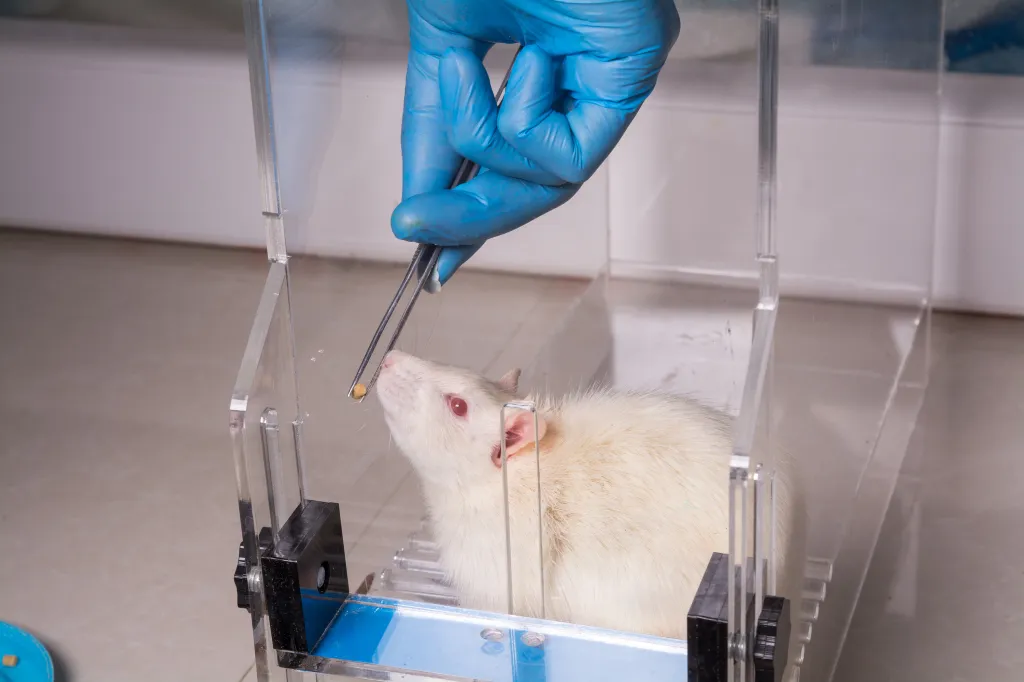
Animal testing in Connecticut rakes in millions in federal dollars each year at colleges and universities but, the National Institutes of Health recently announced it is pivoting from using just animals in medical research, creating controversy on both sides of the animal testing debate.
Several colleges and universities in Connecticut are required to report each year to the U.S. Department of Agriculture Animal and Plant Health Inspection Service on how many animals are being used for research testing and if that testing is “accompanying pain and distress” to the animals.
Federal data shows that last year, a handful of higher education institutions here, including Yale University, the University of Connecticut and School of Medicine, and Quinnipiac University reported to the federal government the use of animals in research.
Federally funded animal testing and research are subject to strict federal and state oversight, according to the NIH. Yale, UConn and other research institutions receive federal grants, but their animal care and use programs are also subject to federal regulations and oversight by federal agencies.
Under federal law, institutions conducting animal research must have an Institutional Animal Care and Use Committee. These committees include scientists, veterinarians and community members. They are responsible for reviewing and approving all animal research projects to ensure humane care and use, as required by federal law.
Yale University conducted the most animal testing in the state last year, according to federal reporting data. In 2024, the university reported animal testing conducted on 12 dogs, 69 guinea pigs, 432 hamsters, 293 white-footed mice, 580 thirteen-lined ground squirrels, 20 rabbits, 101 “non-human primates,” two sheep, 92 pigs and 972 “other animals” not on the federal mandated reporting list. The 12 dogs used in testing were reported to be given a tranquilizer or anesthetic as the testing was conducted because it allegedly caused “accompanying pain and stress.”
The University of Connecticut, not including UConn Health Center, reported conducting experiments on 36 guinea pigs, 71 rabbits, 25 horses, and 25 “farm animals” and 650 birds, according to federal reporting data. The UConn School of Medicine in Farmington reported conducting testing on 136 rabbits, in which 63 of those allegedly reported “conducted involving accompanying pain or distress to the animals and for which the use of appropriate anesthetic, analgesic or tranquilizing drugs would have adversely affected the procedures, results or interpretation of the teaching, research, experiments, surgery or tests.” Another 72 of the rabbits were reported to be given a tranquilizer or anesthetic during the testing.
Other colleges and universities like Quinnipiac University reported conducting testing on 154 tree swallows and 154 “other birds,” but that those tests conducted involved “no pain, distress, or use of pain relieving drugs.” Smaller liberal arts colleges such as Fairfield University and Connecticut College reported no animal testing conducted last year, according to data.
Animal testing is big money at top research colleges, as federal dollars flow into research labs. In 2024, Yale University received more than $645 million in taxpayer funding from the National Institutes of Health, with approximately half of that amount directed toward experiments on animals, according to NIH data. The University of Connecticut School of Medicine in Farmington raked in nearly $60 million in NIH funding. The University of Connecticut in Storrs took in $37 million in federal dollars. A review of the proposed research proposals submitted to the NIH shows many being conducted with animals.
A recent pivot by the federal government away from animal testing may mean colleges and universities in the state lose out on federal dollars. Back in April, the U.S. Food and Drug Administration announced they are replacing animal testing in the development of monoclonal antibody therapies and other drugs with more effective, human-relevant methods. This month, Dr. Jay Bhattacharya, the director of the National Institutes of Health, said the agency is shifting its research priorities away from solely funding animal-based studies, implementing a new policy to no longer issue funding opportunities that exclusively rely on animal models.
“For decades, our biomedical research system has relied heavily on animal models. With this initiative, NIH is ushering in a new era of innovation,” stated Bhattacharya in a statement.
“By integrating advances in data science and technology with our growing understanding of human biology, we can fundamentally reimagine the way research is conducted — from clinical development to real-world application. This human-based approach will accelerate innovation, improve healthcare outcomes and deliver life-changing treatments. It marks a critical leap forward for science, public trust and patient care.”
In addition, the Trump administration recently announced it has canceled nearly $28 million of federal grants for animal testing as major federal health agencies are phasing out research on live animals in favor of new alternatives, according to CBS News. A University of Connecticut spokesperson said that they are currently assessing how this may impact their research grants.
“UConn continues to assess how changes in federal funding impact all aspects of our research enterprise,” UConn spokesperson Stephanie Reitz said.
‘Pivoting from animal testing’
The NIH news came as a shock for animal welfare activists, including the People for the Ethical Treatment of Animals, who have been campaigning for decades on pivoting away from the use of animals in laboratory research. Dr. Alka Cahnda, vice president of PETA’s Laboratory Investigations Department, said that the news was met with excitement from her PETA colleagues.
“For decades, we have viewed the NIH as the genesis of so much abuse and misuse of animals,” Chanda said. “It’s estimated about half of all grants distributed by the NIH goes toward animal testing. So it’s been really surprising and exciting to see the NIH now pivoting from animal testing, which for the most part has been largely ineffective and not needed, and causes suffering and pain to animals. Animal biology is different than humans, and we have seen many times where animal testing results don’t match results with humans.”
Chanda recently penned a letter to Yale’s President Dr. Maurie McInnis, urging her to begin phasing out animal testing. Chanda said that Yale has maintained a Public Health Service Animal Welfare Assurance for decades. She said that animal welfare assurance requires adherence to the guide for the care and use of laboratory animals, including implementing the 3Rs principles: Replacing animal use whenever possible, reducing the number of animals used and refining procedures to minimize suffering.
According the U.S. Department of Agriculture, the number of animals used in experiments at Yale increased by 53.7% from 2020 to 2024, Chanda said.
“These figures directly contradict the university’s assurance to the federal government that it would reduce animal use, exposing a troubling disregard for its stated commitment to adopting non-animal replacements and reducing reliance on animal experimentation,” she said.
But advocates say that animal tests, sometimes involving painful experiments that end in euthanasia, have played a crucial role in developing novel vaccines for COVID-19, malaria, polio and popular medications such as Tylenol and Ozempic. Animal studies also offer a controlled environment for studying diseases, which is often not possible or ethical to do with human subjects.
“Yale believes the humane use of animals in research is more than justified by the benefits it yields to humankind. Virtually all medical advances of the last century would have been impossible without animal research. From antibiotics and blood transfusions to dialysis and organ transplantations, nearly every modern treatment to cure disease and control pain is based on knowledge gained through animal research,” the university said in a statement.
“Today researchers at Yale are working on new therapies and diagnostic tools for a broad range of terminal diseases including Parkinson’s, lung cancer, HIV/AIDS, cystic fibrosis, Alzheimer’s and Muscular Dystrophy — all of which rely on animal models,” the university added. “Our faculty members employ animals only when there are no alternative models for advancing their research.”
UConn also notes, “The University of Connecticut regards the use of animals in research, teaching, and testing to be an integral component of continued progress in science, education, and agriculture.”
Stephen Underwood can be reached at sunderwood@courant.com.



